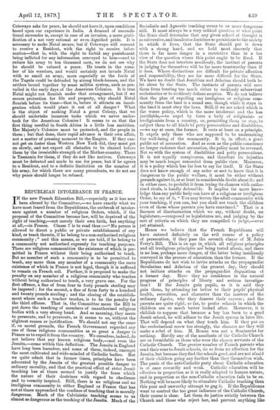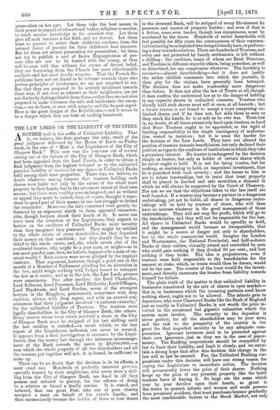REPITBLICAN INTOLERANCE IN FRANCE.
TN the new French Education Bill,—especially as it has now been altered by the Committee,—we have exactly what we have most feared from the Republicans, the outbreak of intoler- ance against a number of religious Orders, which, if the proposal of the Committee become law, will be deprived of the right of teaching,—not merely their own faith, but anything at all,—in France. Clause 7 is to read thus :—" No person is allowed to direct a public or private establishment of any kind, or teach therein, if he belong to a non-authorised religious community ; " and this means, as we are told, if he belong to a community not authorised expressly for teaching purposes. There are religious communities the existence of which is per- mitted in France without their being authorised to teach. But no member of such a community is to be permitted to teach, any more than any member of a community the mere existence of which in France is not legal, though it is suffered to remain on French soil. Further, it is proposed to make the penalty on any member of a religious community who teaches without being authorised to teach, a very grave one. For the first offence, a fine of from four to forty pounds sterling may be imposed ; for the second, a fine of from forty to a hundred and twenty pounds sterling ; and the closing of the establish- ment where such a teacher teaches, is to be the penalty for the third offence. That is, the Committee mean the Bill to put down the teaching of members of unauthorised religions bodies with a very strong hand. And so meaning, they mean to persecute, and to persecute, as it seems to us, without the slightest reason or justification. We should not say the same if, on moral grounds, the French Government regarded any one of these religions communities as so great a danger to France as to expel it from the country. We ourselves, indeed, do not believe that any known religious body,—not even the Jesuits,—come within this definition. The Jesuits in England have long been harmless, and some of them, indeed, amongst the most cultivated and wide-minded of Catholic bodies. But we quite admit that in former times, principles have been advocated by the Jesuits of the greatest possible danger to ordinary morality, and that the practical effect of strict Jesuit teaching has at times seemed to justify the fears which the nature of their doctrines with regard to obedience and to veracity inspired. Still, there is no religious and no irreligious community in either England or France that has not at times approached the confines of teaching that is morally dangerous. Much of the Calvinistic teaching seems to us almost as dangerous as the teaching of the Jesuits. Much of the Socialistic and Agnostic teaching seems to us more dangerous still. It must always be a very critical question at what point the State shall determine that any given school of thought is so subversive, and inculcates doctrines so pernicious to the society in which it lives, that the State should put it down with a strong hand, and we hold most sincerely that there is far more danger in a restrictive than in a lax view of the question where this point ought to be fixed. If the State does not interfere needlessly, the instinct of parents in judging for themselves will be far more trustworthy than if it does. Where distinctions are difficult for private affection and responsibility, they are far more difficult for the State.
We have no doubt that Jesuitism and Atheism should both be let alone by the State. The instincts of parents will save them from trusting too much either to recklessly subservient ecclesiastics or to recklessly defiant sceptics. We do not believe that the plan of expelling any irreligious or religious com- munity from the land is a sound one, though while it stays in the land it must obey the laws. Still, if we are asked which is the worse policy, which is the more intolerant and the less justifiable,—to expel by force a body of religionists or irreligionists from a country, or, permitting them to stay, to subject them to all kinds bf petty persecutions and disabilities, —we say at once, the former. It rests at least on a principle. It expels only those who are supposed to be undermining the well-being of the community. It is, in effect, a great public act of accusation. And as soon as the public conscience no longer endorses that accusation, the policy must be reversed. Not so with the system of disabilities and petty persecutions. It is not equally conspicuous, and therefore its injustice may be much longer concealed from public view. Moreover, it is a policy which has far less to say for itself. If the State does not know enough of any order or sect to know that it is dangerous to the public welfare, it must be either without grounds against it, or at least in considerable doubt about it; and in either case, to prohibit it from trying its chances with autho- rised rivals, is hardly defensible. It implies far more know- ledge than any public body can have of a religious or irreligious Order, to say of it, "You may leaven the adult community with your teaching, if you can, but you shall not teach the children even of those whose parents you have convinced." That is a fineness of discrimination which we say, without doubt, no legislature,—composed as legislatures are, and judging by the sort of criteria on which they are compelled to judge,—ever yet attained.
Hence we believe that the French Republicans will have entered definitely on the evil course of a policy of persecution, if they pass the seventh clause of M. Jules Ferry's Bill. This is an age in which all religious principles and all irreligious principles are being tested afresh, and there is no less, perhaps more danger, of the latter being insidiously conveyed in the process of education, than the former. If the Republicans do not wish to invite attacks on the propagandist Secularism and Atheism of the present day, they should not initiate attacks on the propagandist dogmatism of a former day. Have they no confidence in the natural progress of principles of liberty and serious investiga- tion? If the Jesuits gain pupils, as it is said they gain them, by attending far better to their pupils' physical health, recreation, and character than the masters of the ordinary Lycees, why they deserve their success ; and the parents are quite right, so far, to prefer schools in which the children are so much better looked after. Moreover, it is childish to suppose that because a boy has been to a good Jesuit school, he will adhere to the Jesuit system in later life. That will depend on what they teach him. If they put on the ecclesiastical screw too strongly, the chances are they will make a rebel of him. M. Renan was not a Seminarist for nothing. Hardly any of the assailants of the Catholic Church are so formidable as those who were the chosen servants of the Catholic Church. The greater number of French parents who send their sons to Jesuit schools, do so from no affection for the Jesuits, but because they find the schools good, and are not afraid of their children going any further than they themselves wish. The panic of the anti-Catholic party about Catholic education is at once cowardly and weak. Catholic education will be effective in proportion as it is really adapted to human nature, and in proportion as the non-Catholic education fails to be so. Nothing will be more likely to stimulate Catholic teaching than this poor and unworthy attempt to gag it. If the Republicans want to control the too great influence of the Catholic Church, their course is clear. Let them do justice strictly between the Church and those who reject her, and prevent anything like persecution on her part. Let them take the best means in their power to compel all educational bodies, religious or secular, to teach secular knowledge in the soundest way. Let them give all such teachers a fair field, and no favour. Let them trust to parents to select their children's teachers, from the natural desire of parents for their children's best interests. But let them not return persecution for persecution ; let them not try to publish a sort of Index Expurgatorius of per- sons who are not to be trusted with the young, or they will be soon told that without the excuse of devout belief, they are borrowing from the Church her most objectionable methods and her most deadly weapons. That the French Re- publicans have not yet learnt to be tolerant towards those who profess principles of intolerance, we are not surprised to see. But that they are prepared to be actively intolerant towards those who, if not even as tolerant as their neighbours, are yet not distinctly distinguishable from them,—that they are not even prepared to make tolerance the rule and intolerance the excep- tion,—we do learn, at once with surprise and the deepest regret. Here is the great danger of the Republicans,—and it seems to be a danger which they are bent on making imminent.



































 Previous page
Previous page